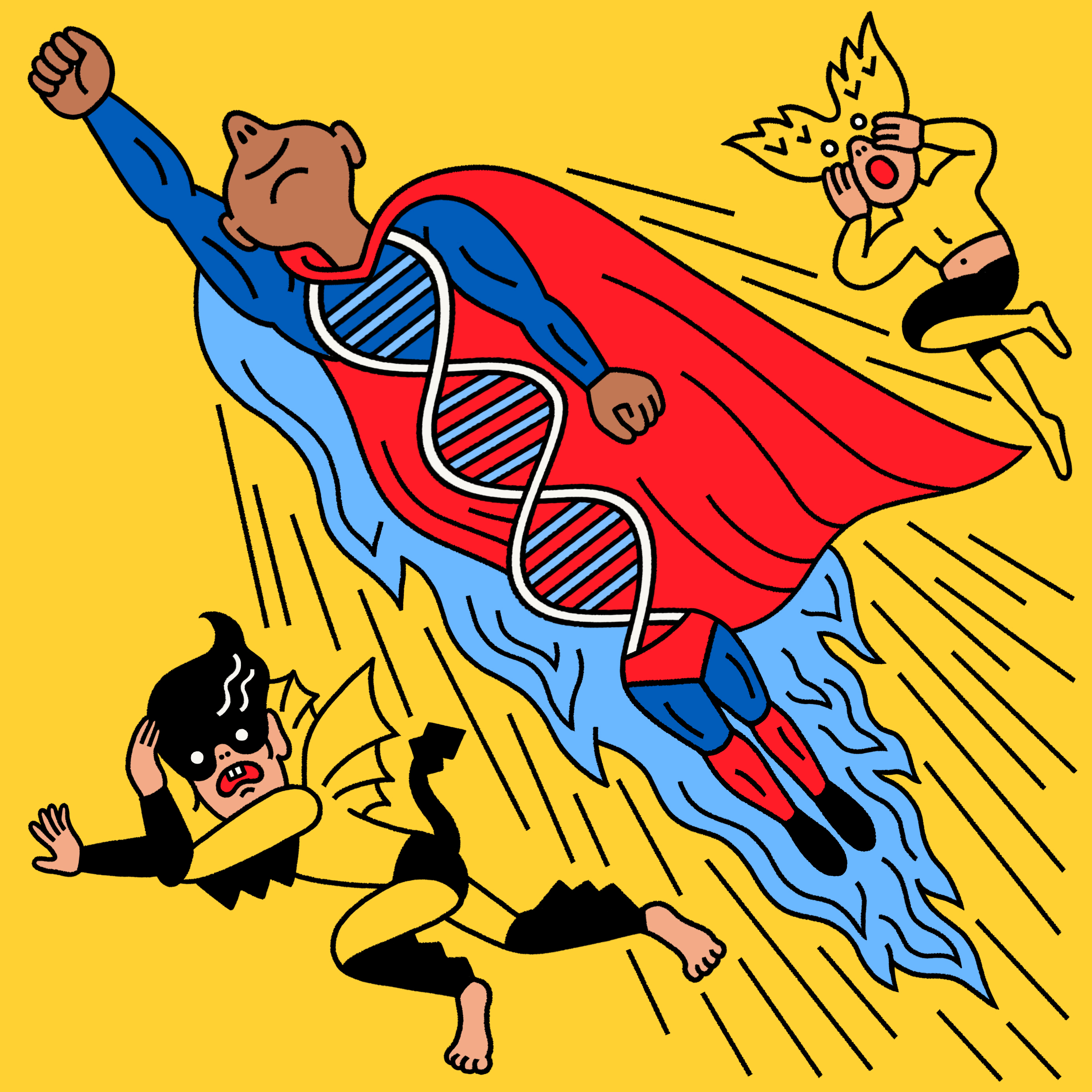Search for New Medical Treatments Zeroes In on Genetic Superheroes

The hunt is on for people who are healthy—even though their genes say they shouldn’t be.
A massive search through genetic databases has found evidence for more than a dozen “genetic superheroes,” people whose genomes contain serious DNA errors that cause devastating childhood illnesses but who say they aren’t sick.
The new study is part of a trend toward studying the DNA of unusually healthy people to determine if there’s something about them that can be discovered and bottled up as a treatment for everyone else.
There’s already evidence from large families afflicted by genetic disease that some members are affected differently—or not at all. The current study took a different approach, scouring DNA data collected on 589,306 mostly unrelated individuals, and is the “the largest genome study to date,” according to Mount Sinai’s Icahn School of Medicine in New York.
“There hasn’t been nearly enough attention paid to looking at healthy people’s genomes,” says Eric Topol, a cardiologist and gene scientist at the Scripps Institute. “This confirms that there are many people out there that should be manifesting disease but aren’t. It’s a lesson from nature.”
The researchers, led by Stephen Friend, president of Sage Bionetworks, a nonprofit based in Seattle, and genome scientist Eric Schadt of Mount Sinai, reported today in Nature Biotechnology how they looked for people with mutations in any of 874 genes that should doom them to a childhood of pain or misery, but whose medical records or self-reports didn’t indicate any problem.
In the end, they found 13 people who qualify as genetic “superheroes” but, under medical privacy agreements, were unable to contact them. That meant the scientists weren’t able to learn what’s actually different about them. “It’s like you got the box and couldn’t take the wrapping off,” Friend said during a media teleconference last week.
The team consulted DNA data from nearly 400,000 people provided by 23andMe, the direct-to-consumer testing company. The team also used more detailed genome information contributed by BGI, a large genome center in China, and the Ontario Institute for Cancer Research.
“The best approach to discovering large numbers of resilient individuals will involve data sharing on a global scale, involving many sequencing projects,” says Daniel MacArthur, who developed a pooled DNA database at the Broad Institute in Cambridge, Massachusetts, which he says also holds evidence of resilient individuals.
Some companies, including the biotechnology company Regeneron (see “The Search for Exceptional Genomes”), have already started large searches for people whose genes seem to protect them against disease. Regeneron's focus is on common illnesses like heart disease and diabetes.
Mayana Zatz, a geneticist in Sao Paulo, Brazil, who studies large families affected by inherited disease, says she’s found instances where people seem to dodge genetic destiny. For example, she located two Brazilian half-brothers with the same mutation that causes muscular dystrophy, but while one was in a wheelchair at age nine, the other is 16 and has no symptoms.
Zatz says the reason could be some other gene that “rescues” the patient, or perhaps environmental factors. She says women are more often found to be resilient than men, though the reason isn’t clear.
Friend says his “extraordinarily large pilot” study is meant to determine if the same sort of discoveries made by looking at affected families could be made by dredging large DNA databases. “The purpose was to see if the technology is ready, and worth the effort, and we think the answer is yes,“ he says.
Keep Reading
Most Popular
Large language models can do jaw-dropping things. But nobody knows exactly why.
And that's a problem. Figuring it out is one of the biggest scientific puzzles of our time and a crucial step towards controlling more powerful future models.
How scientists traced a mysterious covid case back to six toilets
When wastewater surveillance turns into a hunt for a single infected individual, the ethics get tricky.
The problem with plug-in hybrids? Their drivers.
Plug-in hybrids are often sold as a transition to EVs, but new data from Europe shows we’re still underestimating the emissions they produce.
Stay connected
Get the latest updates from
MIT Technology Review
Discover special offers, top stories, upcoming events, and more.